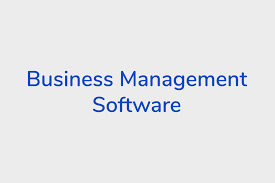In today’s fast-paced business environment, efficiency and streamlined operations are essential for success. Business Management Software (BMS) has emerged as a crucial tool for companies looking to enhance productivity, reduce operational costs, and improve decision-making. Whether a small startup or a large enterprise, businesses across various industries leverage BMS to optimize processes and maintain a competitive edge.
This article explores the concept of Business Management Software, its key features, benefits, types, and how businesses can choose the right software to meet their unique needs.

What is Business Management Software?
Business Management Software refers to a suite of applications and tools designed to facilitate and manage various business operations, including finance, human resources, sales, customer relationships, and supply chain management. It integrates different functions into a unified platform, enabling seamless communication and workflow automation.
Features of Business Management Software
Effective BMS solutions offer a range of features to support business operations. Some of the key features include:
- Enterprise Resource Planning (ERP) – Manages core business processes such as accounting, procurement, project management, and compliance.
- Customer Relationship Management (CRM) – Helps businesses track customer interactions, improve engagement, and enhance sales strategies.
- Human Resource Management (HRM) – Supports payroll processing, employee data management, recruitment, and performance tracking.
- Inventory and Supply Chain Management – Enables tracking and optimizing inventory levels, order fulfillment, and supplier relationships.
- Project Management – Assists teams in planning, executing, and monitoring projects efficiently.
- Financial Management – Handles budgeting, financial reporting, and accounting tasks.
- Business Intelligence (BI) and Analytics – Provides real-time insights and data-driven decision-making capabilities.
- Workflow Automation – Reduces manual tasks by automating repetitive processes, thereby improving efficiency.
- Document Management – Helps store, organize, and retrieve important business documents in a secure manner.
- Collaboration and Communication Tools – Enhances team communication through integrated messaging, email, and video conferencing features.
Benefits of Business Management Software
Implementing a robust BMS can significantly enhance a company’s operational efficiency. Here are some of the main benefits:
- Improved Productivity – Automating routine tasks allows employees to focus on strategic initiatives, increasing overall productivity.
- Cost Savings – By reducing manual labor and errors, businesses save on operational costs and enhance profitability.
- Enhanced Decision-Making – Access to real-time data and analytics supports better business decisions.
- Streamlined Communication – Teams can collaborate more effectively, ensuring smooth workflow across departments.
- Scalability – BMS solutions are designed to grow with businesses, accommodating increased workloads and complex operations.
- Better Customer Relationship Management – Integrated CRM tools help in managing customer interactions, leading to improved customer satisfaction and retention.
- Regulatory Compliance – Many BMS solutions come with compliance management features, helping businesses adhere to industry regulations.
- Centralized Data Management – A unified system ensures all business data is stored in a central location, reducing data silos and redundancy.
Types of Business Management Software
Different types of BMS cater to specific business needs. Here are some of the most common types,
1. Enterprise Resource Planning (ERP) Software
ERP systems integrate core business processes into a single platform, providing real-time insights and automation across departments. Popular ERP solutions include SAP, Oracle NetSuite, and Microsoft Dynamics.
2. Customer Relationship Management (CRM) Software
CRM tools help businesses manage customer interactions, sales processes, and marketing efforts. Some well-known CRM solutions include Salesforce, HubSpot, and Zoho CRM.
3. Project Management Software
These tools assist in task scheduling, collaboration, and progress tracking. Examples include Asana, Trello, and Monday.com.
4. Accounting and Financial Management Software
These solutions help businesses track expenses, generate invoices, and manage budgets. Popular choices include QuickBooks, FreshBooks, and Xero.
5. Human Resource Management Software (HRM)
HRM software supports payroll, recruitment, performance management, and employee engagement. Examples include BambooHR, Workday, and ADP.
6. Supply Chain Management Software
Businesses use these solutions to optimize logistics, supplier relationships, and inventory control. Examples include SAP SCM and Oracle SCM.
7. E-commerce Management Software
For online businesses, e-commerce platforms like Shopify, Magento, and WooCommerce streamline sales, inventory, and customer service.
8. Business Intelligence (BI) Software
BI tools provide data analytics and reporting to help businesses make informed decisions. Notable examples include Tableau, Power BI, and Looker.
Choosing the Right Business Management Software
Selecting the right BMS is crucial for achieving optimal efficiency. Here are some factors to consider:
- Business Needs – Identify specific challenges and requirements to find a software solution that aligns with your goals.
- Scalability – Choose a system that can grow with your business.
- Ease of Use – A user-friendly interface ensures employees can adapt quickly.
- Integration Capabilities – Ensure the software integrates seamlessly with existing tools and systems.
- Cost – Consider both initial investment and long-term maintenance costs.
- Security – Data security is critical, so choose software with strong security features.
- Customization – Some businesses require custom features tailored to their industry needs.
- Customer Support – Reliable customer support ensures smooth implementation and troubleshooting.
Business Management Software has revolutionized how companies operate, making processes more efficient, reducing costs, and improving overall productivity. Whether managing finances, human resources, customer relationships, or supply chains, a well-implemented BMS can be a game changer. Choosing the right BMS requires careful evaluation of business needs, scalability, integration capabilities, and security features. With the right software, businesses can enhance operational efficiency and gain a competitive edge in today’s dynamic market. Investing in Business Management Software is no longer a luxury but a necessity for businesses aiming for long-term growth and success. By leveraging the power of technology, companies can streamline operations and stay ahead in the digital age.
